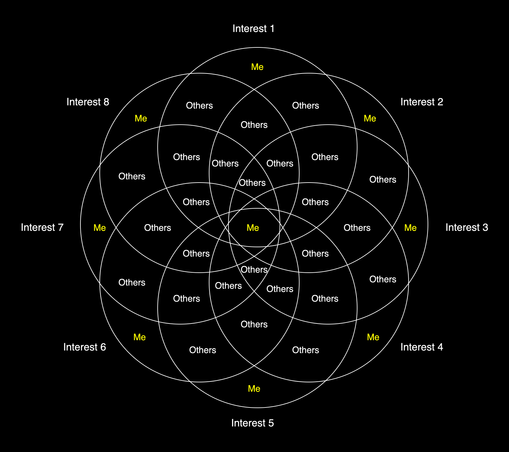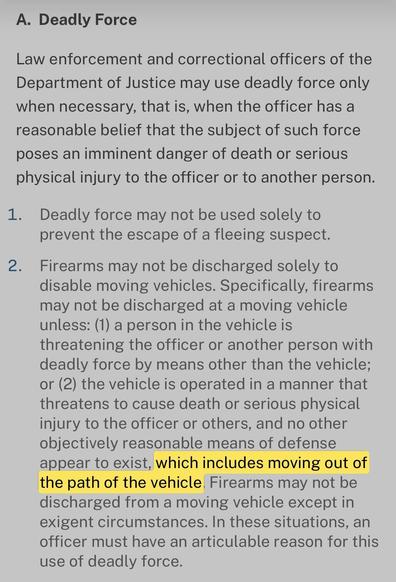2025-12-10 14:08:11
The Venn Diagram of Perceived Loneliness...
Just came across this again in my archives — it so brutally & succinctly expresses the feeling our cultures & social connections seem to have turned into... Even though we should know that it isn't like that at all, two decades of exploitative commercialized social media (not the only reason; pandemic, tech, politics being others...) have conditioned & segmented people to believe it, experience it to varying degrees, and then …
2026-01-08 22:36:21
He was already out of the path of the vehicle when he decided to shoot her.
US Department of Justice Policy On Use Of Force
https://www.justice.gov/jm/1-16000-department-justice-policy-use-force#1-16.200
2026-02-10 21:15:57
Alright, time for the custom cart/Kefka revenge tour! I'm feeling like crap, but I figured playing a bit o' vidya games would help out. Time for some Final Fantasy 6 in the only way I know how to play it: on an old CRT TV with more than a bit of profanity.
https://youtube.com/live/DYgQrEHGvag?f
2025-12-06 16:10:40
We’ve updated the draft GCVE BCP-05 standard to introduce flexible record types, making it easier to extend, enrich, and structure security advisories.
Comments are more than welcome!
#gcve #cve #vulnerability
2025-12-08 08:18:30
Robust forecast aggregation via additional queries
Rafael Frongillo, Mary Monroe, Eric Neyman, Bo Waggoner
https://arxiv.org/abs/2512.05271 https://arxiv.org/pdf/2512.05271 https://arxiv.org/html/2512.05271
arXiv:2512.05271v1 Announce Type: new
Abstract: We study the problem of robust forecast aggregation: combining expert forecasts with provable accuracy guarantees compared to the best possible aggregation of the underlying information. Prior work shows strong impossibility results, e.g. that even under natural assumptions, no aggregation of the experts' individual forecasts can outperform simply following a random expert (Neyman and Roughgarden, 2022).
In this paper, we introduce a more general framework that allows the principal to elicit richer information from experts through structured queries. Our framework ensures that experts will truthfully report their underlying beliefs, and also enables us to define notions of complexity over the difficulty of asking these queries. Under a general model of independent but overlapping expert signals, we show that optimal aggregation is achievable in the worst case with each complexity measure bounded above by the number of agents $n$. We further establish tight tradeoffs between accuracy and query complexity: aggregation error decreases linearly with the number of queries, and vanishes when the "order of reasoning" and number of agents relevant to a query is $\omega(\sqrt{n})$. These results demonstrate that modest extensions to the space of expert queries dramatically strengthen the power of robust forecast aggregation. We therefore expect that our new query framework will open up a fruitful line of research in this area.
toXiv_bot_toot
2025-12-06 04:03:31
US immigration authorities arrested a visiting professor at Harvard law school
after he was charged with discharging a pellet gun outside a Massachusetts synagogue the day before Yom Kippur,
– and he agreed to leave the country.
Carlos Portugal Gouvea, a Brazilian citizen, was arrested on Wednesday by US Immigration and Customs Enforcement (ICE)
after his temporary nonimmigrant visa was revoked by the state department
following what the Trump administration labe…
2025-12-05 11:48:36
Following law enforcement’s disruption of two high-profile ransomware groups, ransomware incidents reported to FinCEN decreased in 2024, with 1,476 incidents, reflecting $734 million in the aggregate value of reported payments in BSA reports.
https://www.fincen.gov/news/news-rele…
2025-12-02 20:16:18
Running my own full-service, multi-tenanted & multi-domain email service gives me a remarkable feeling of power. It's is seriously cool (been running 4 of them for a bunch of years). In other news, Mailcow is superb - . https://mailcow.email/ (I run their Dockerized install)
2026-01-31 08:52:27
GCVE-BCP-08 - GCVE GNA Directory File
Following some good pre-discussion at #fosdem - a first draft of the directory file specification has been updated. The goal is clarify some of the fields. Feedback is more than welcome.
@…@…



